Blog
February 3rd, 2015
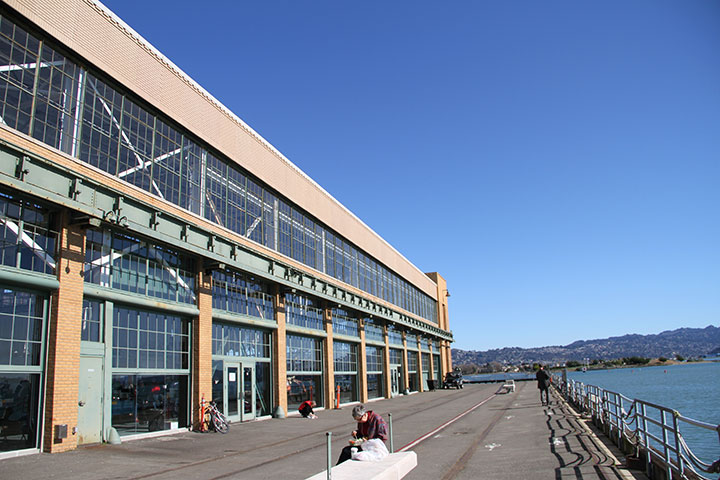
Well, I’m hitting the road again—I can’t believe it’s been two years already, but the CODEX Bookfair has come around again. Jessica and I will both be exhibiting, and we’ll have lots of new projects making their debut there (including the new Dead Feminist broadside!)
The best thing about CODEX is being able to stand in a room with hundreds of pieces of art—art that you can touch, while you have a conversation with the artist who made it. The event showcases the work of some of the best book artists, printmakers, paper artists and typographers working today—the result is an astounding display of artwork and ephemera from all over the world. So if you’re even remotely local, it’s well worth the trip.
You’ll find me at the Anagram Press table (#84)—so stop by and say hello!
Fifth CODEX International Bookfair
February 8-11, 2015
Craneway Pavilion, Richmond, CA
Open today and Tuesday 12:30 to 6; Wednesday 10 to 3
Admission: $10 per day ($5 students) or $30 for multi-day pass
March 18th, 2013
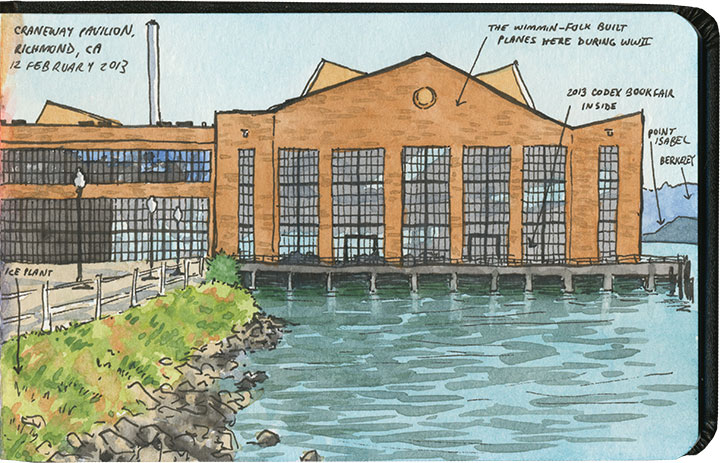
It’s hard to believe it’s been two years since the last one, but a few weeks ago I was back for my second showing at the Codex International Bookfair. The four-day fair was at a new venue this year—a space so gorgeous just I had to break out the ol’ sketchbook.
This year (and hopefully every year from here on out) we were hosted by the Craneway Pavilion in Richmond, CA. Now a part of Rosie the Riveter National Historic Park (bonus points for being part of something else I love), the former Ford plant was used as a major military plant during World War II.
We had completely outgrown the old Codex stomping grounds in Berkeley—so while none of us knew what to expect of the new space, we were just hoping it would be big enough to fit a couple hundred artists under one roof.

We got way more than we bargained for—the space is absolutely cavernous. The bookfair was every bit as overwhelming as last time (just try looking at a few thousand pieces of art in four days!), but the Craneway gave the perfect breathing room to do the artwork justice. With its huge banks of windows and three-story ceiling, it almost felt like I was spending each day outdoors. I hated leaving at the end of each day.

And besides—this was the view from my table. Is there anything better than showing your work on one of the best chunks of real estate in the Bay Area? (Though I have to admit, every morning that one—admittedly awesome—Journey song would pop into my head, just like it always does when I’m in the area.*)
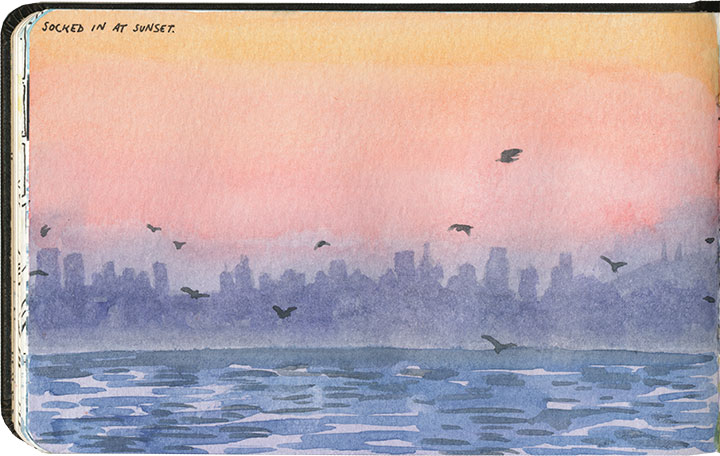
Occasionally I had to remind myself that I wasn’t just there to stare out the window, or bask in the sunshine on the dock outside, or scribble in my sketchbook. But I’m grateful to report that I had a nearly constant stream of visitors to my table to bring me back to reality when I needed it.
Huge props to all the folks who made the commute up to Richmond from San Francisco and Oakland (including Sarah and M-A for their help manning the table!)—judging by the comments I heard all week, you liked the new space as much as I did. And many thanks to all the return visitors from two years ago who came back to say hello (special shout-out to Adam D.!) or leave me with their own goodies. It felt great to be welcomed back.
One last thing: major thanks to Kate Farnady, who created this off-the-cuff stop-motion video of my Local Conditions book, right in the middle of our conversation about it. You made my day.
Codex, I’ll see you in two years—with any luck, right there on the waterfront again.
* Okay, you are not going to believe this, but as I wrote that sentence, that song came up on shuffle in my iTunes! Cross my heart. I’m officially freaked out now…
February 12th, 2013
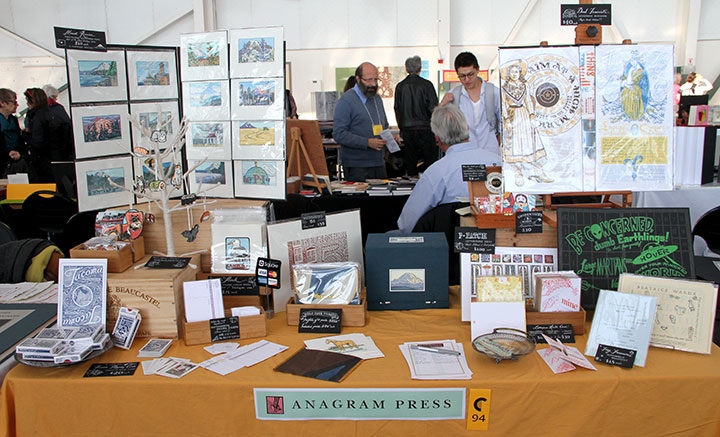
Right now I’m in California, manning my table at the Codex Book Fair. But I have to say, it’s a little hard to concentrate.
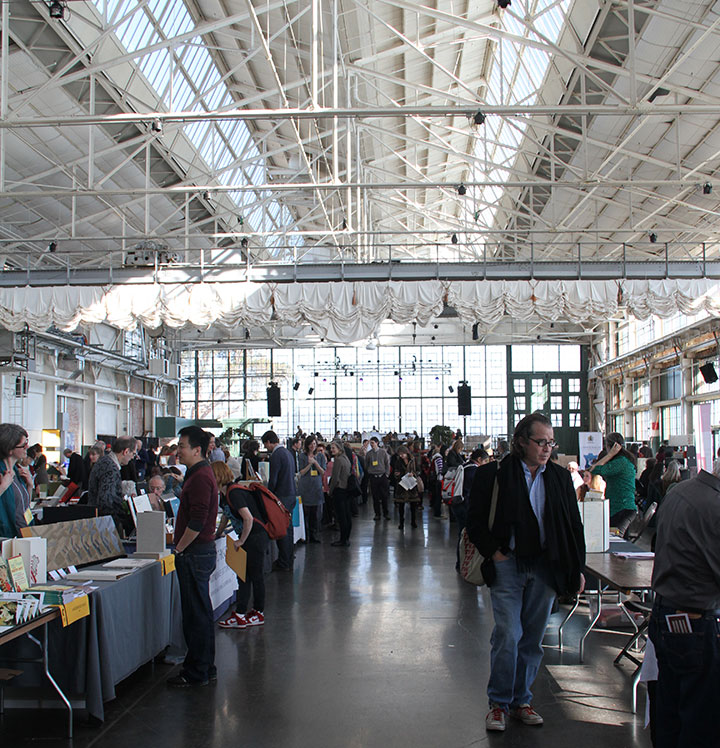
I mean, not only am I surrounded by incredible work by a couple hundred artists—but just look at this space! We’re in a new venue this year, and it is absolutely spectacular.
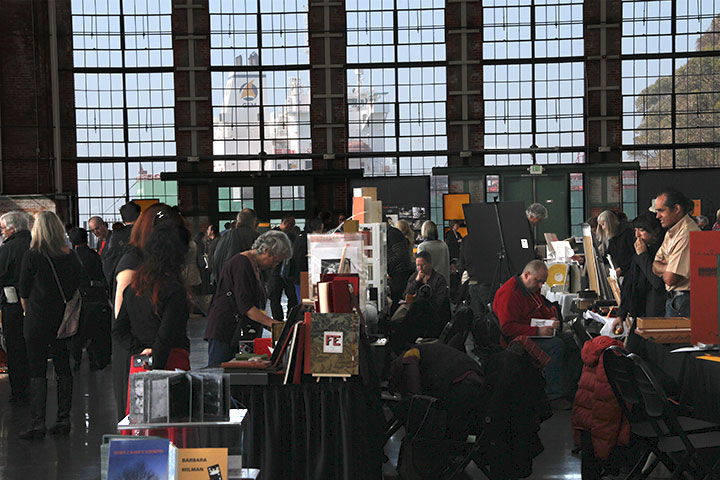
Plus, we’re literally right on the water (really—the pavilion sits right on a pier), so as if all the artwork here weren’t distraction enough, all anyone has to do is just gaze out the window.
Now, it’s a good thing my studio isn’t in a place like this—I don’t think I’d ever get any work done!
May 25th, 2012
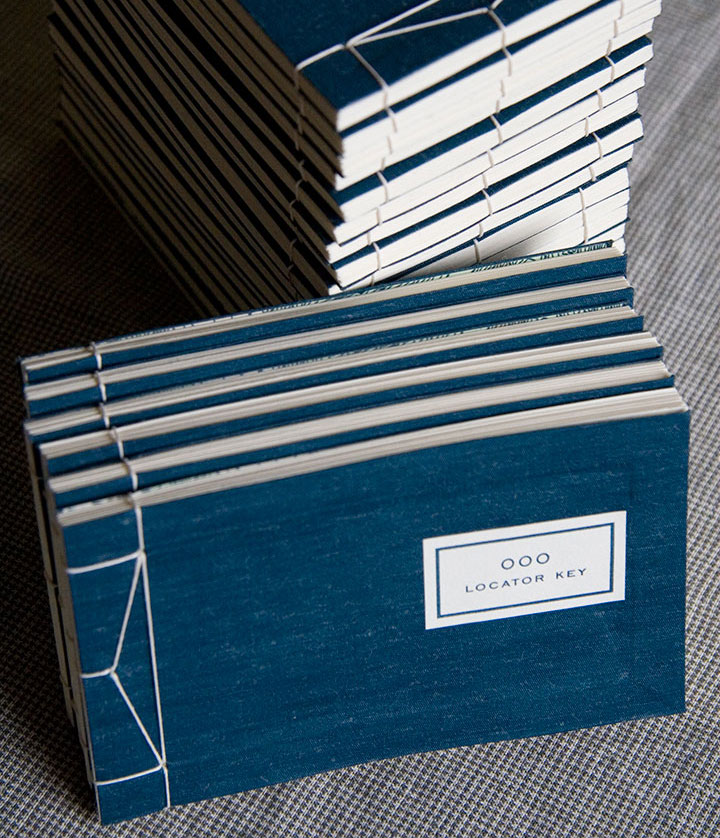
Speaking of keeping busy, looks like I’m not the only one who’s been working on my Local Conditions book. The kind folks at Stanford University put together a little video demonstrating how book works. So now, instead of having to explain it step-by-step, and hope for the best, I can actually show you in real time. Take a gander:
And if you happen to be in the Bay Area, you can see the book for yourself at the San Francisco Center for the Book. From now through August 31, Local Conditions is on display as part of the exhibition Exploding the Codex. The show highlights unusual and unexpected structures by over forty artists—pieces that blow the lid off of the standard definition of what a book can be. I’m sad not to be able to get there myself before the show closes, but if you’re in the area, stop by on June 15 for the opening reception—and tell ’em hello from me.
October 17th, 2011
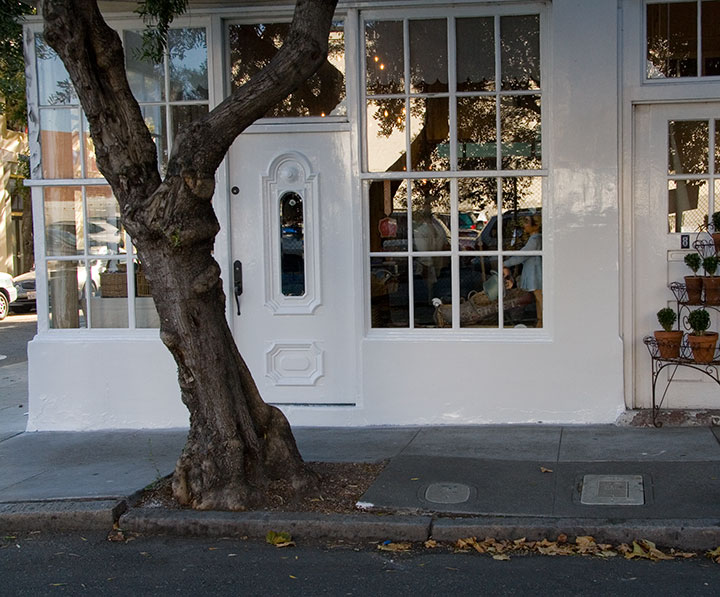
You already know that I have a thing for hidden, quiet spaces tucked away within large cities. So imagine my delight when Jessica turned me onto this place.
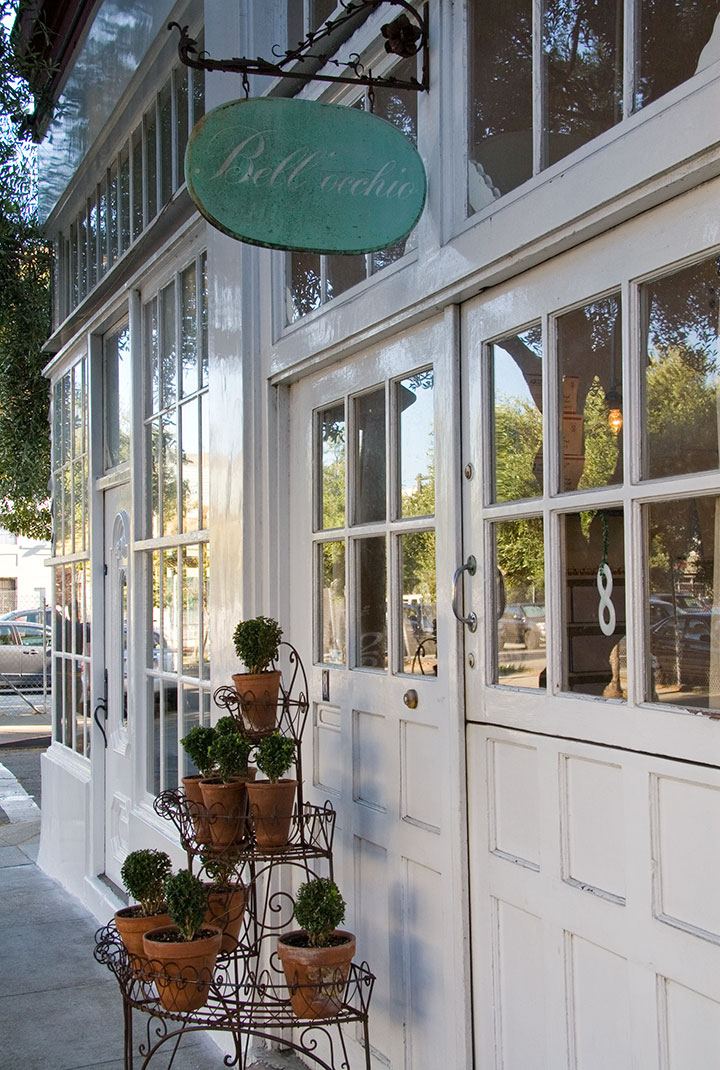
Bell’occhio has quickly become my favorite (and most regularly visited) haunt in San Francisco. It’s easy to miss—it’s just a few steps off of the main drag of Market Street, but the little lane upon which it’s situated is so quiet that it seems transplanted from a different era.
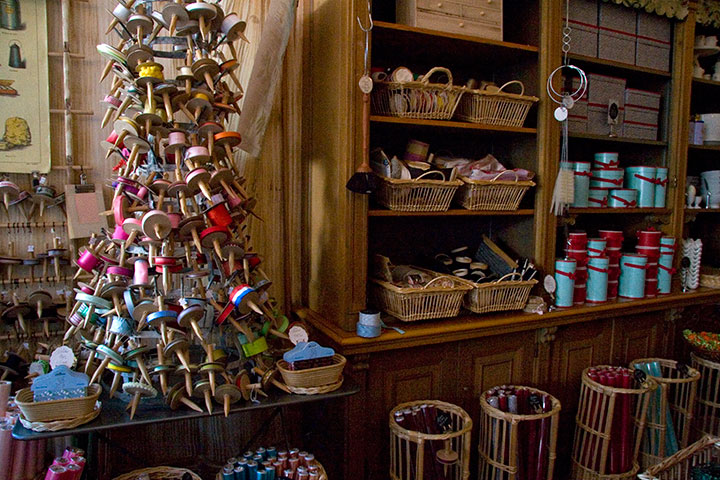
The feeling doubles as soon as you step foot inside the shop. The place is a living, breathing Kunstkammer, with all manner of beautiful odds and ends you never knew you so desperately needed.
My favorite part, though, is the overall presentation. All her inventory is kept in baskets, drawers and wooden cabinets, like a Victorian general store. Each price tag is hand-calligraphed in flowing script. And whenever you purchase something (and I just dare you to visit and not buy something!), your items are packed in vellum envelopes and muslin drawstring bags. Which just about makes me swoon.
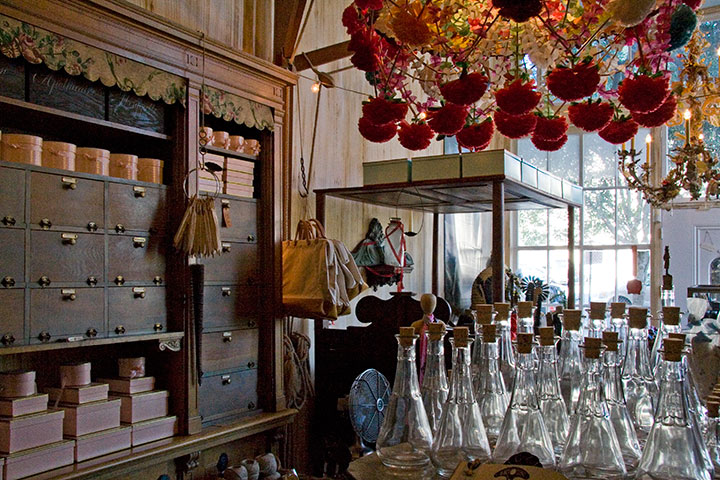
The owner, Claudia Schwartz, was very kind to let me take a few photos and spread the word about the place. She opened Bell’occhio in 1988, but now that this sort of aesthetic is all the rage again, I’m sure she runs a huge risk of having her ideas lifted by copycats. Ever walk into an Anthropologie? I’m pretty sure they stole their whole schtick from her. So Claudia, thank you for allowing me to share your world.
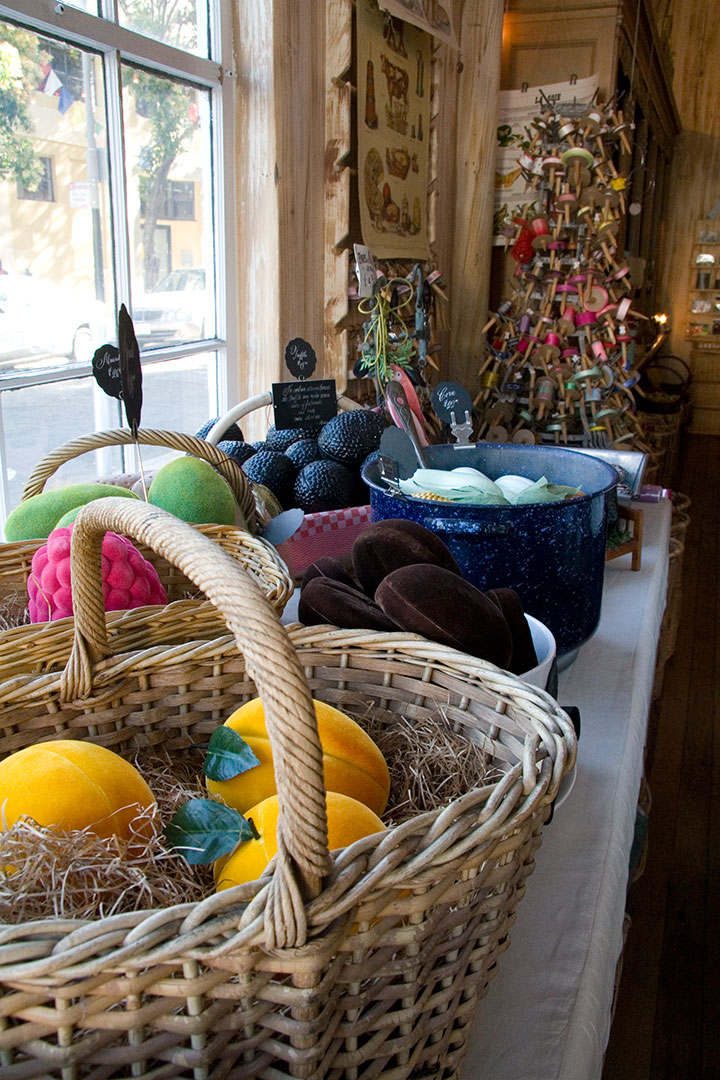
Now, whenever I return to San Francisco, I have a separate Bell’occhio budget—as crazy as that sounds. It’s the one recommendation I can offer if you’re going to come here. Otherwise, this place will have you impulse-buying before you can say, “I’ll take three of those!”
October 14th, 2011
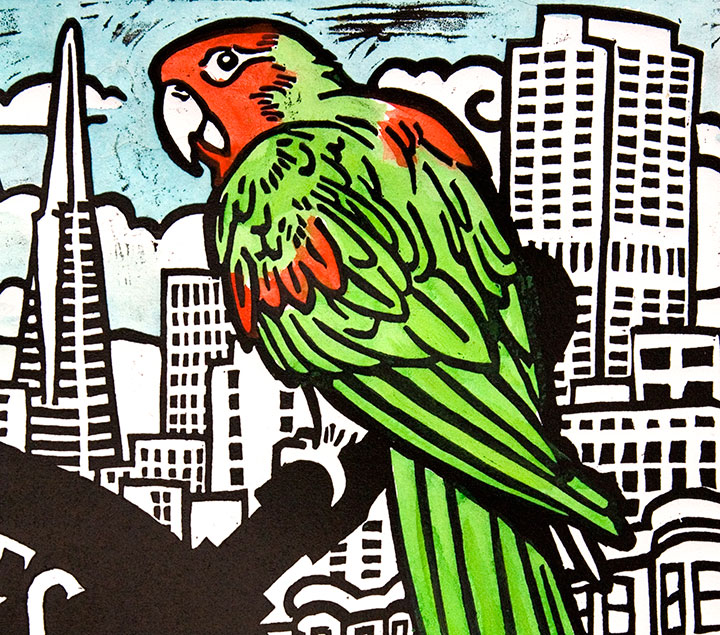
Since I’ve had parrots on the brain for so long, I thought it would make a fitting end to my San Francisco trip to go in search of them. You see, according to legend documented fact, San Francisco has a wild population of feral parrots—if that isn’t nautically themed, I don’t know what is. Yarr!
I’d been told, however, that while popular culture has named them “the parrots of Telegraph Hill,” they didn’t actually spend much time there—so we had no idea where to look for them.
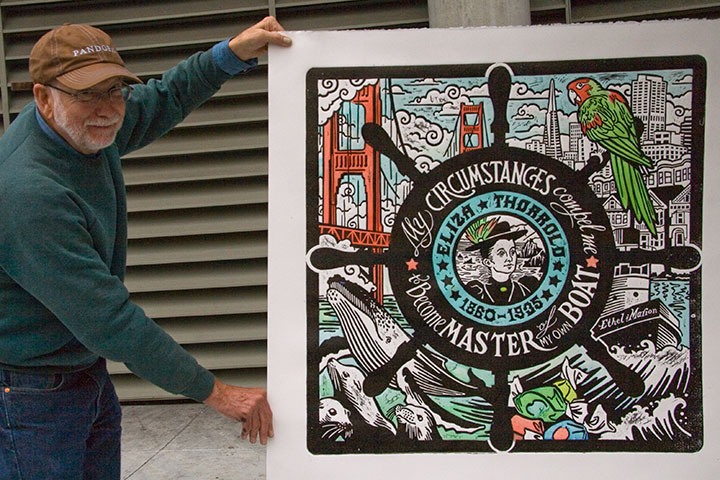
Jessica’s uncle David (pictured here with our print!), who’s lived in SF for decades, came to the rescue. He told me that actually, Telegraph Hill was a good place to look on Sunday mornings in September, and even if I didn’t find any birds, it made for a nice wooded walk.
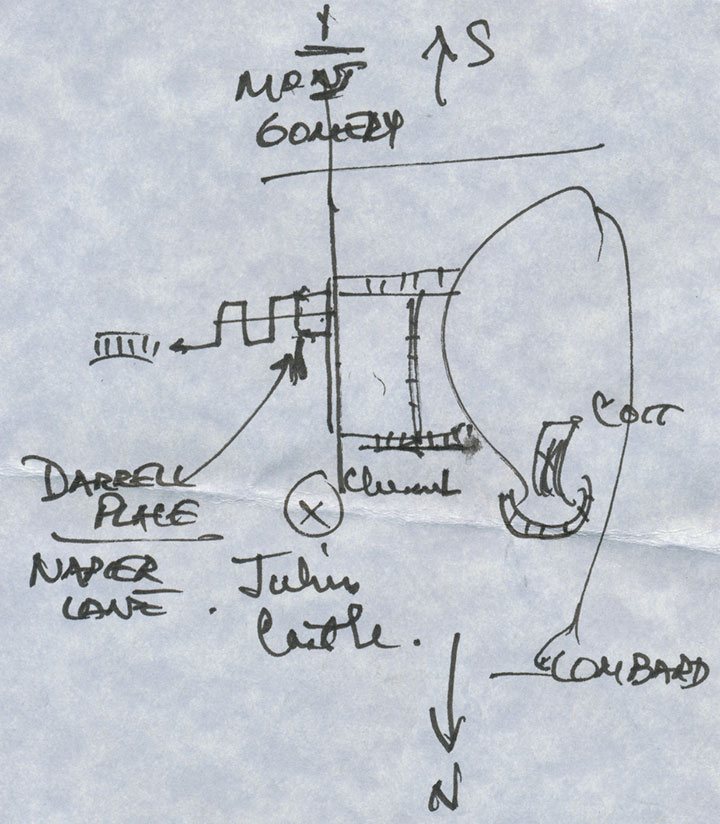
He even scribbled a little map to show me a likely spot. Somehow, that little gesture made the whole thing a hundred times more exciting—I tend to explore cities without atlases or guides (or Googles) anyway, so this little scrap of paper turned a morning hike into a treasure hunt.
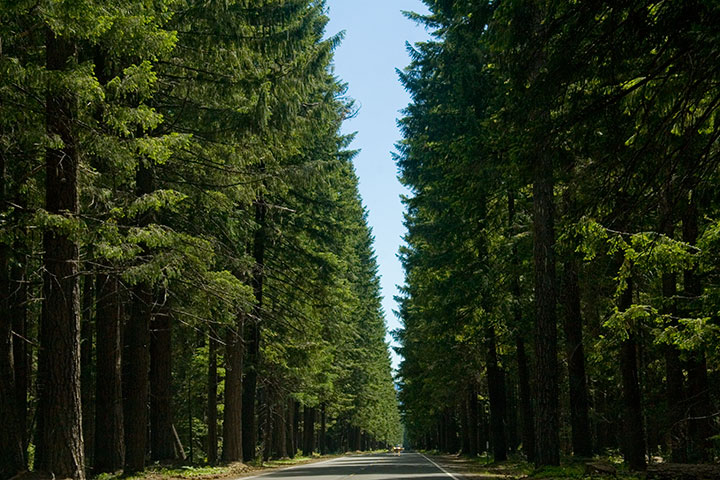
Now, I’m not sure exactly what I was expecting, but I’m a northern gal, so when somebody suggests walking through the woods, this is what pops into my head.
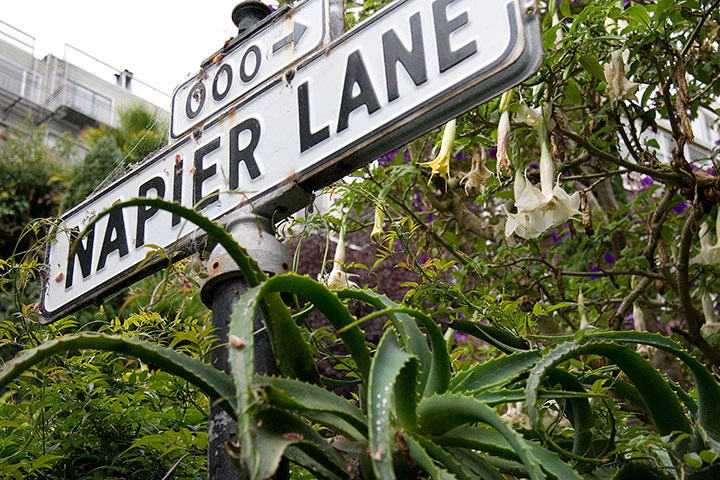
This, on the other hand, was a surprise.
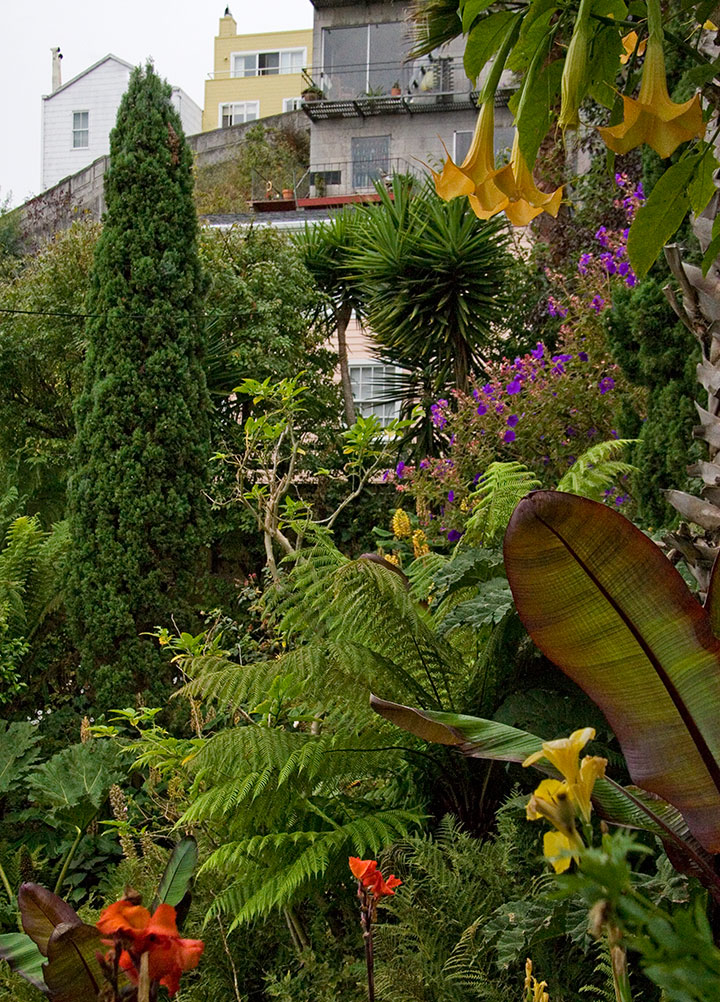
Compared to the mossy pines and cedars in my frame of reference, Telegraph Hill felt like a tropical jungle.
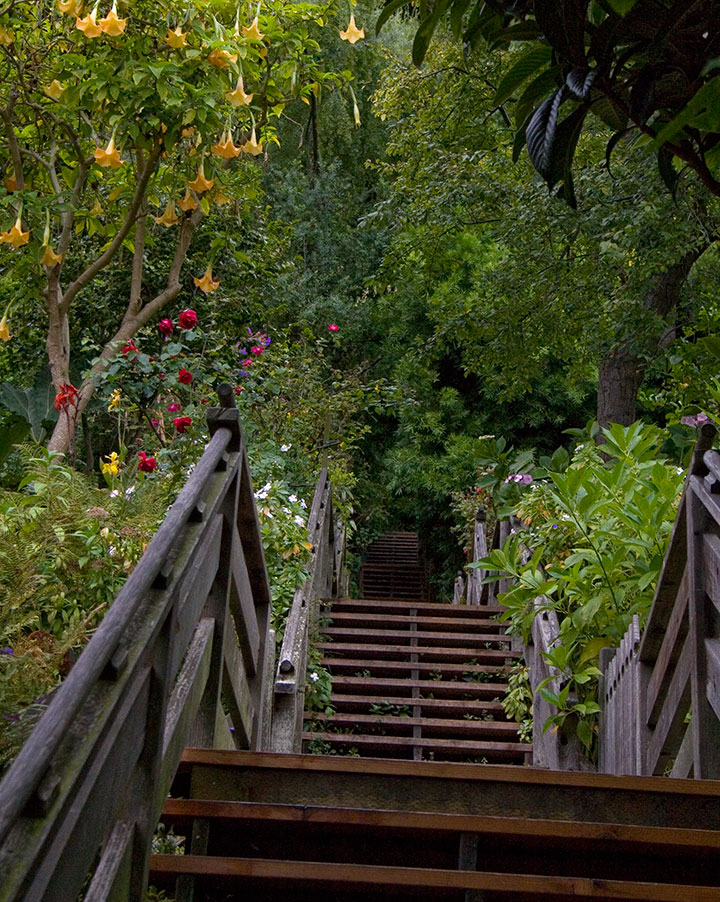
My friends and I had the place almost entirely to ourselves—it was a dark, dreary day, which discouraged all the sun-lovers. So as we wound our way up the steps, it felt like we’d stumbled upon our own private garden, or maybe a path to some other world.
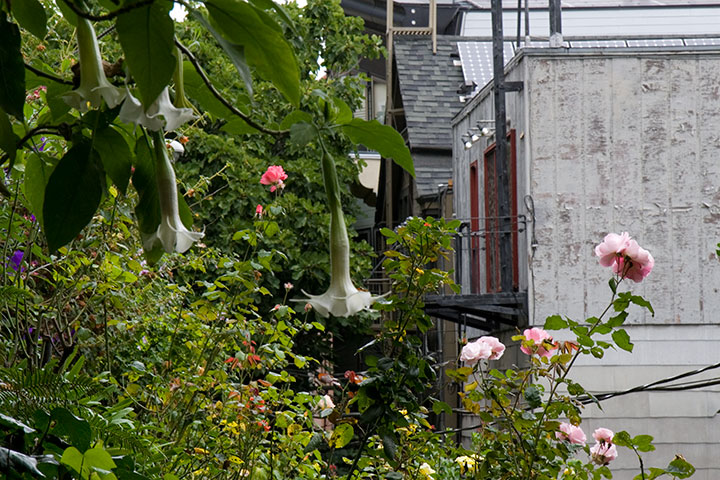
It was easy to forget that we were in the heart of a densely packed city (in California, no less)—this felt more like a secret, slightly English enclave through which we’d been granted safe passage.
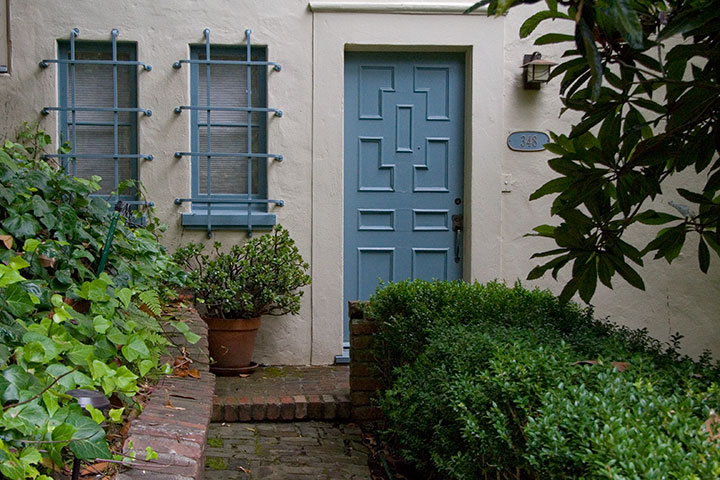
Around every bend was a door, or a courtyard, or another track. Each felt like a gateway to something else, to maybe more and more and more worlds beyond our little slice of perception. It was a hint that what we could see was just the beginning—that what we couldn’t see was out of reach, and all the more tempting for it.
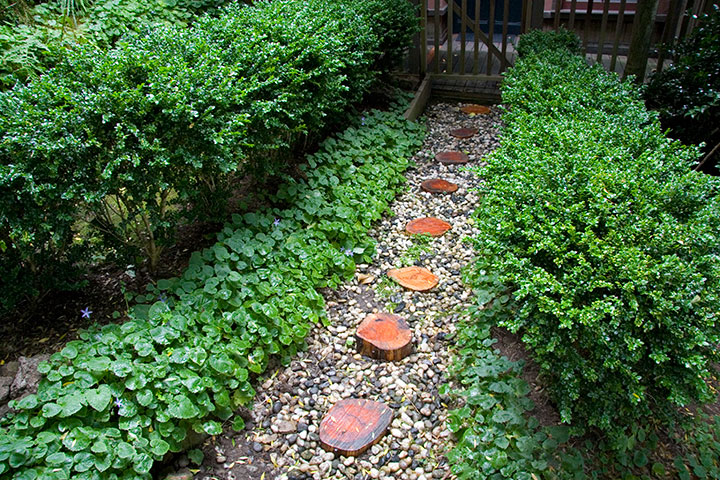
That sort of feeling is just my cup of tea, you know?
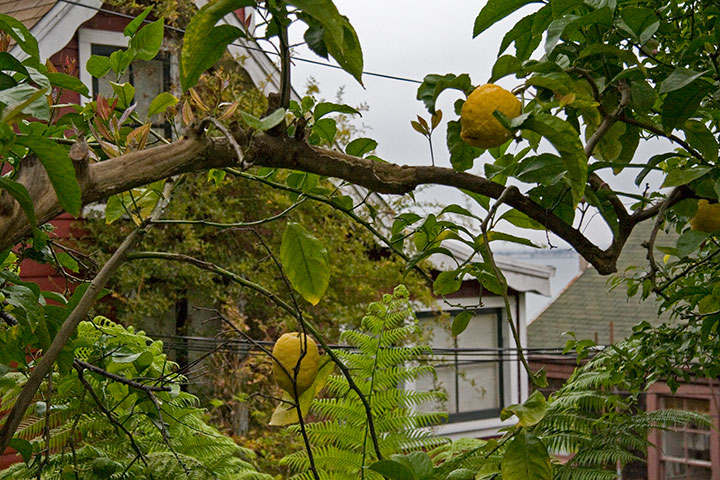
Every time that pleasant disorientation threatened to overwhelm me, though, out popped little hints of where I really was.
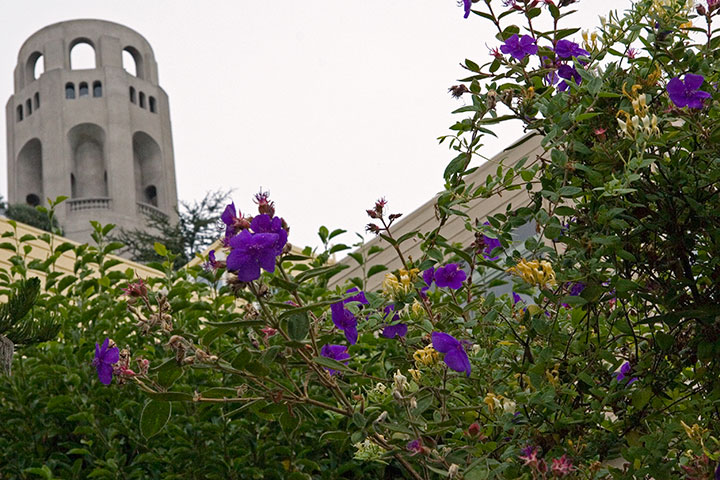
And whenever the trees gave way to open sky, guide posts appeared, showing us the way back—
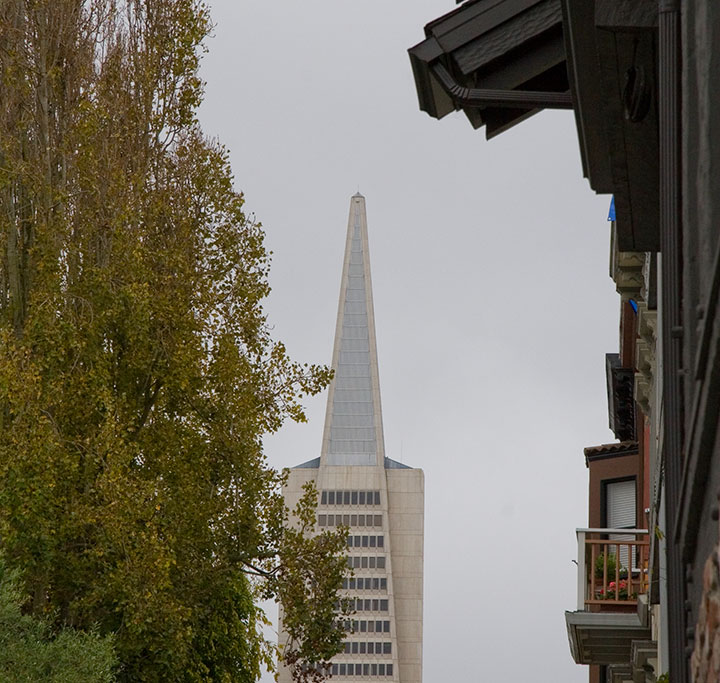
and reminding us that reality was a stone’s throw away.
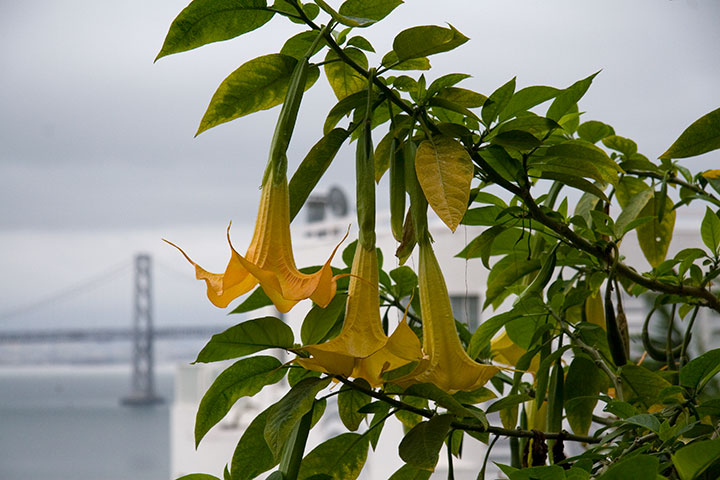
I almost forgot that we were even looking for parrots.
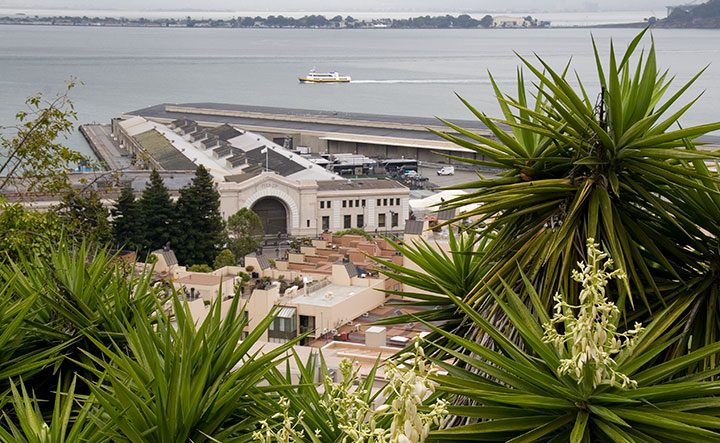
At the top of the hill, we heard a telltale squawking. I glanced up to catch a quick glimpse of two green birds with long tailfeathers speeding away to the west—unfortunately, my shutter finger wasn’t fast enough on the draw.
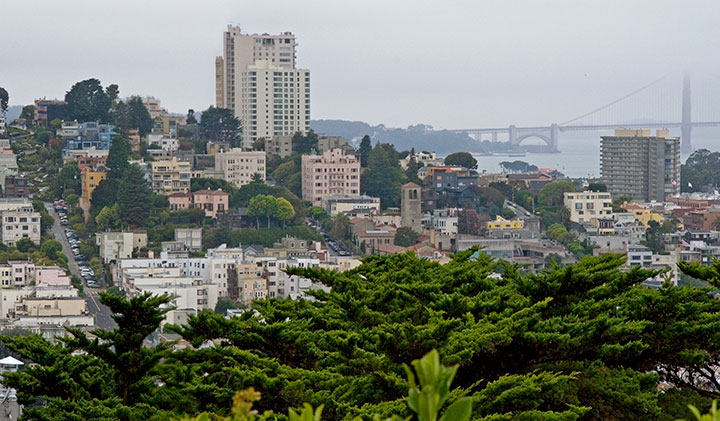
It’s like a ‘Where’s Waldo’ of SF—can you spot Lombard Street? The Golden Gate?
Oh, well. The view alone was the perfect end to the walk.
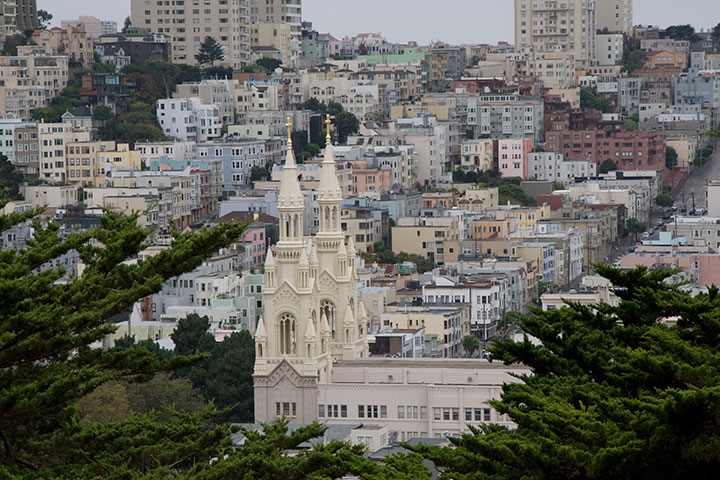
The vista of pastel stucco seemed like a gift, a reward at the end of an uncertain journey. It reminded me of what I love most about the place: that the city itself is like a garden of color—an urban forest in bloom.
* * *
Thank you so much for the amazing response you’ve had to the Apocalypse Calendar! Literally overnight you’ve helped us raise over $1000. We have until the clock strikes midnight on Halloween to reach our goal—thank you for helping us get there!
October 1st, 2011
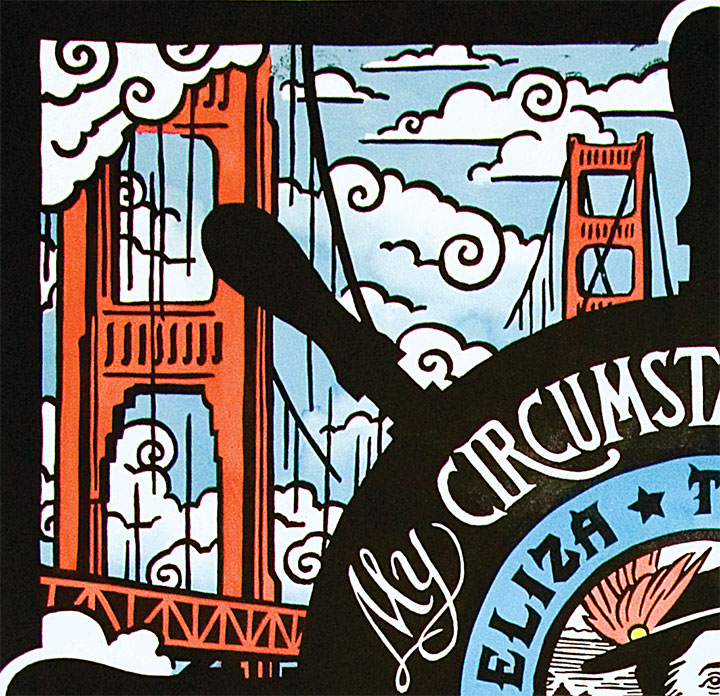
It’s hard to think of a better weekend activity than taking a quick trip to San Francisco.
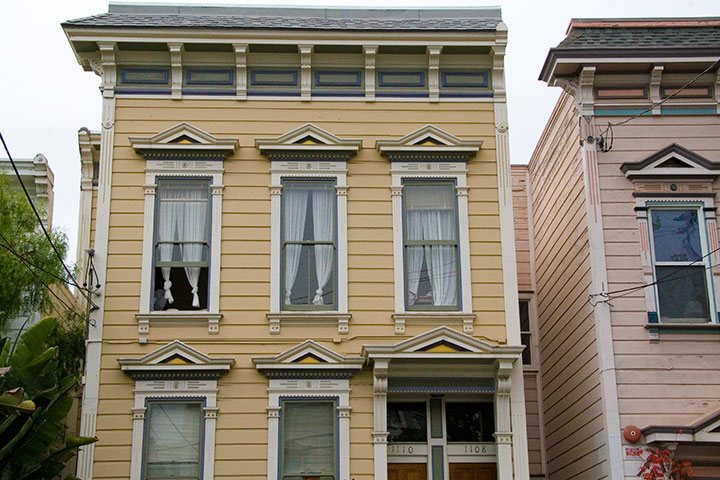
First of all, Jessica and I got to visit the lovely Sarah and Jesse, who live here—
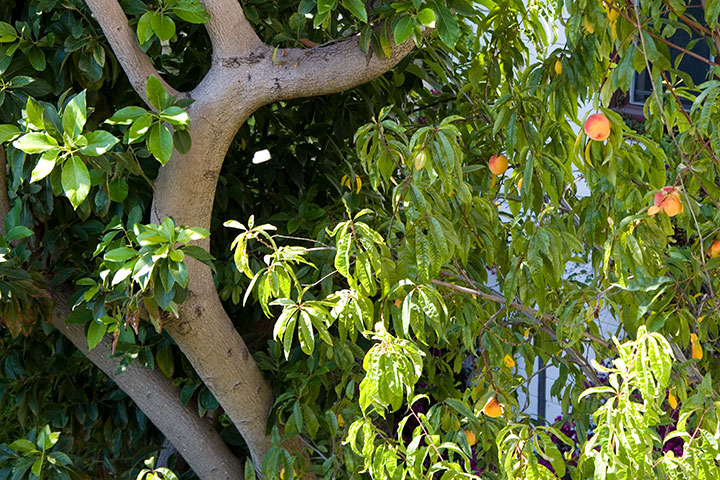
and whose back yard contains this.
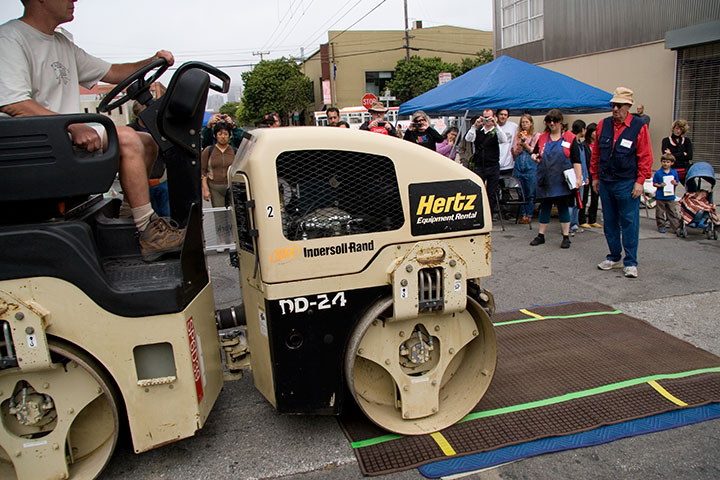
And then we got to raise a fantastic ruckus and make guerrilla street art with a whole bunch of people looking on.
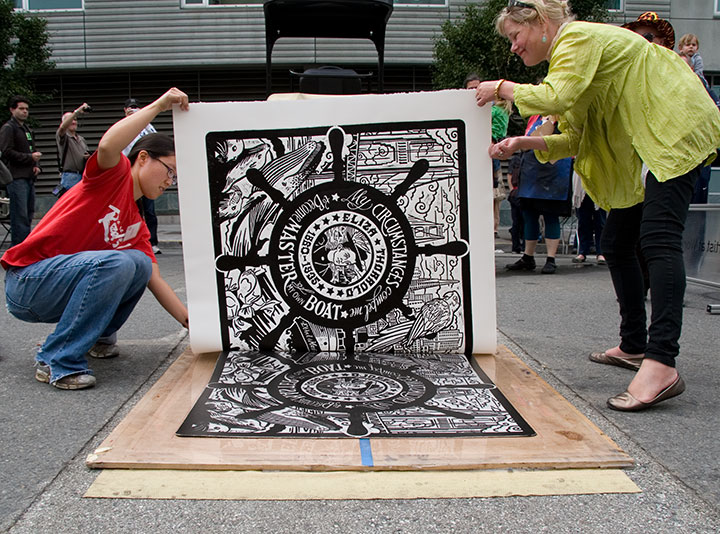
SFCB’s got this thing down to a science. Between the small army of volunteers who took care of the inking and registration (line-up),
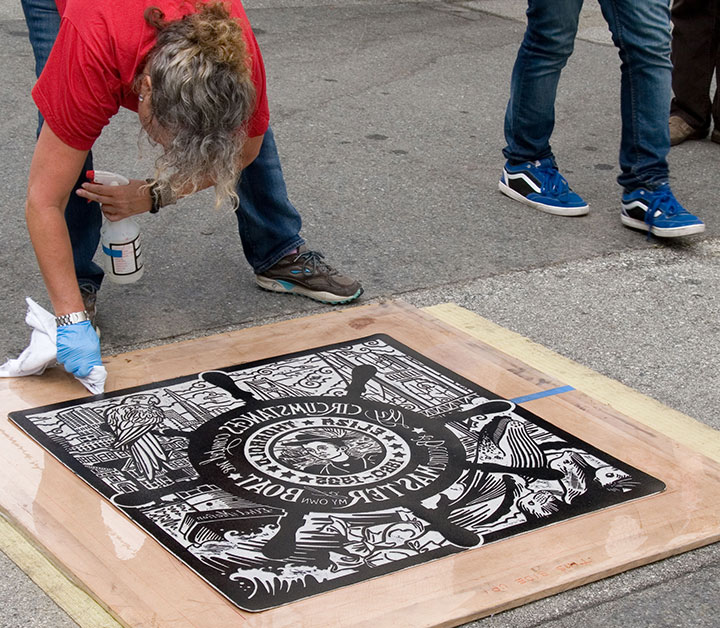
and their probably-patented methods for keeping street schmutz off the prints, the results were impressive. In fact, this is my fourth steamroller print (and Jessica’s fifth), and I’ve never seen one turn out this well before.
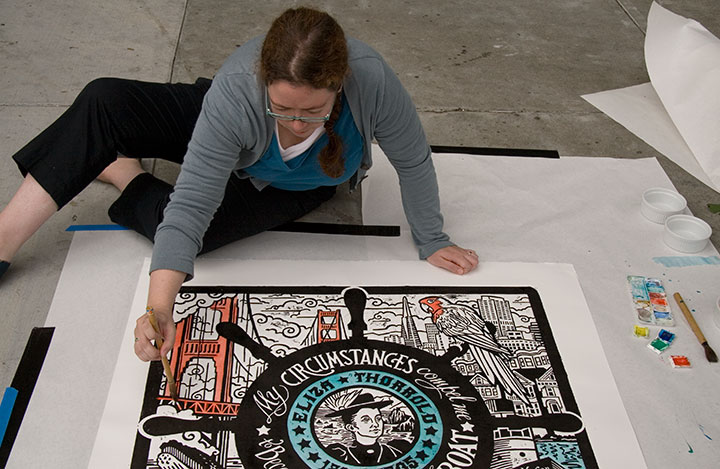
Photos of us by Jesse Mullan
Besides, we really needed to keep our hands clean this time, because we upped our personal ante and just plunked ourselves down on the sidewalk for a bit of on-the-fly hand-coloring (though avoiding the very wet ink felt kind of like playing Twister).
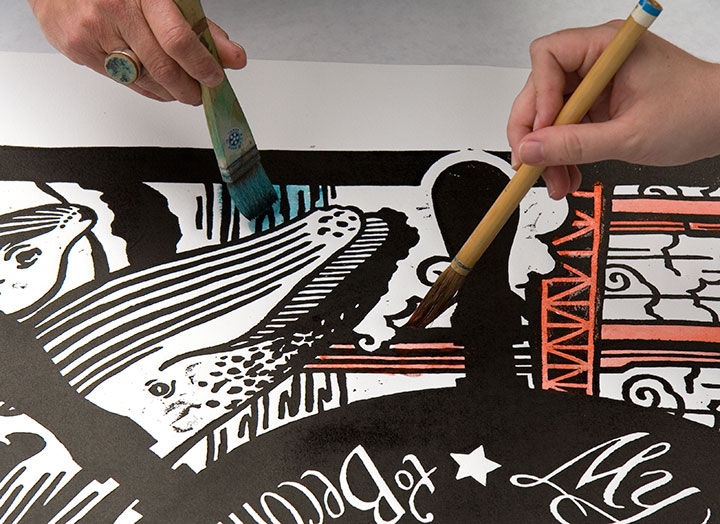
That turned out to be the perfect tag-team job, actually. I do a lot of hand-coloring when I print, as you know, but never anything this big—
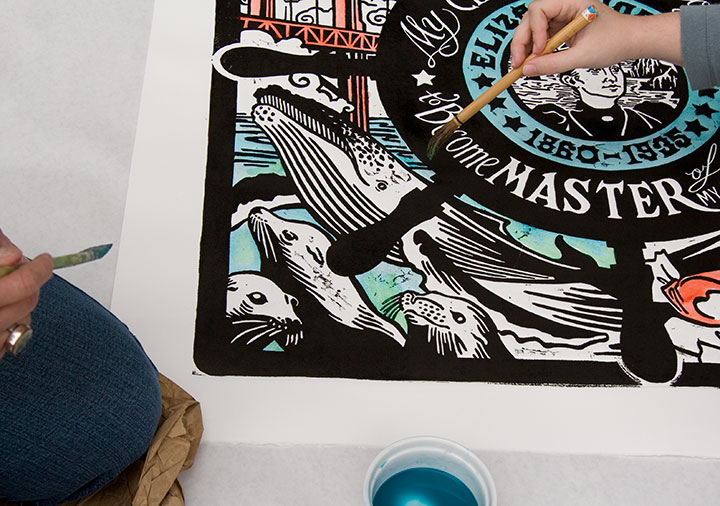
having two sets of hands to blend colors and two sets of eyes to look for missed spots was definitely the way to go.
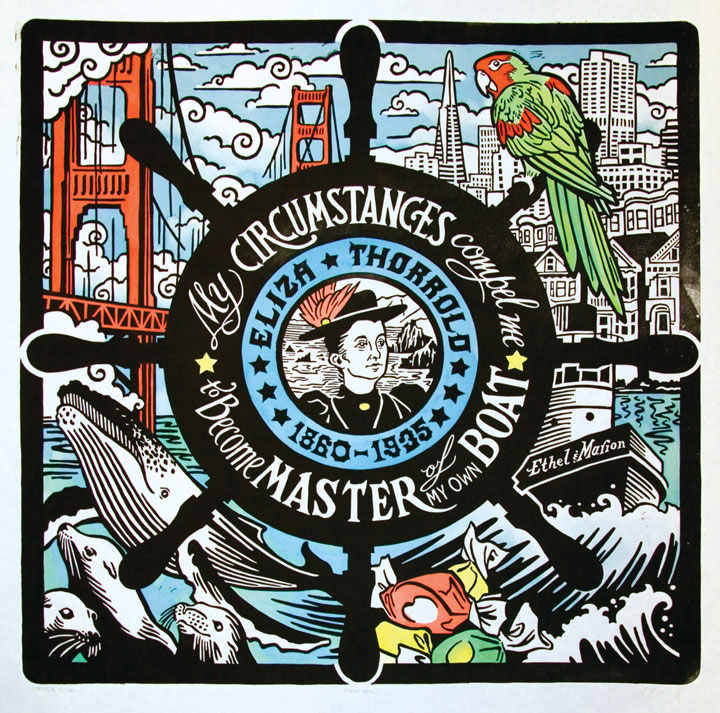
So thar she blows. Let me introduce you to Eliza Thorrold, and our latest honorary Dead Feminist print, Even Keel. Eliza was the first licensed female tugboat master on San Francisco Bay. After Charles, her husband who piloted the Ethel & Marion before her, died an untimely death, she fought for and received her operator’s license to continue their tug business in his stead and provide for her family. Her quote says it all: “My circumstances compel me to become master of my own boat.” Hear, hear, Eliza.
After she left the high seas and entered retirement as a landlubber, she became master of her own taffy pull by opening a successful ice cream and candy shop with her son. Hence all that salt water taffy. And as if the nautical sweet-shop theme weren’t enough, we couldn’t resist throwing in all our favorite things about San Francisco. So go hunting around the image, and see what you turn up. Then, on your next trip to the City by the Bay, learn more about Eliza’s life (and those of other women mariners) at San Francisco Maritime National Historical Park.
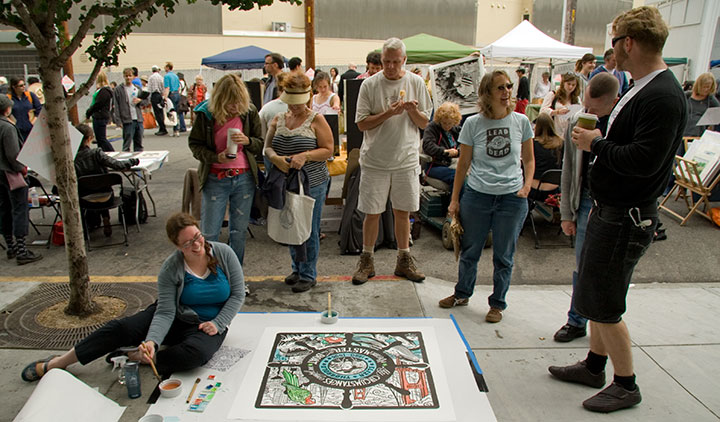
So, yeah. It might not fit the traditional idea of a productive weekend, but it’ll do. We came away with new friends, blue fingertips and a whole lot of ideas to make our own humble little steamroller party better.
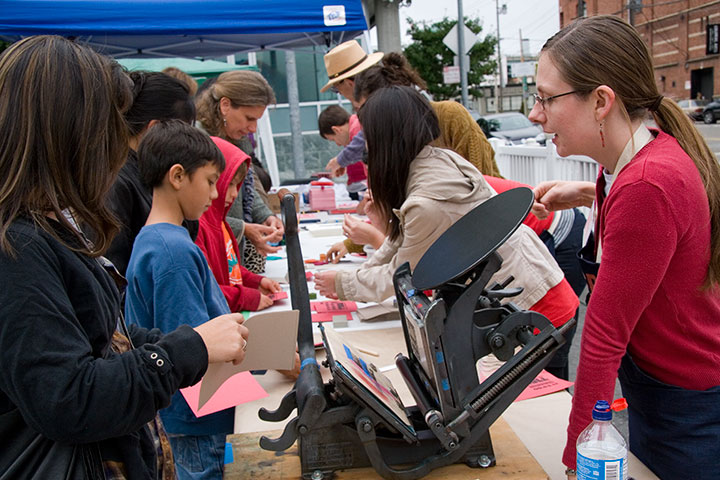
Many thanks to all the staff and volunteers of the San Francisco Center for the Book, who made the day a smashing success—
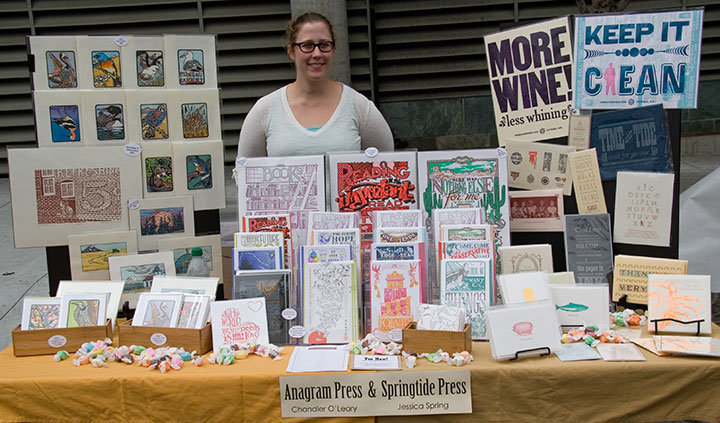
and to all the kindred spirits who lent a whole bunch of helping hands. Like the super-nice TSA employee who took such great care of our linoleum block and didn’t bat an eye that we had to bring something so huge and bizarre onto an airplane. Like Sarah, who manned our table; and Jesse, who shot most of the photos; and the huge, huggable posse of Jessica’s extended family, who helped schlep things and kept us company and bought us beignets. And especially Jessica’s ten-year-old niece, Luciana, who basically designed our table arrangement. ‘Ciani, you’re one awesome ragazza.
And of course, to Eliza—thanks for standing proud at the helm.
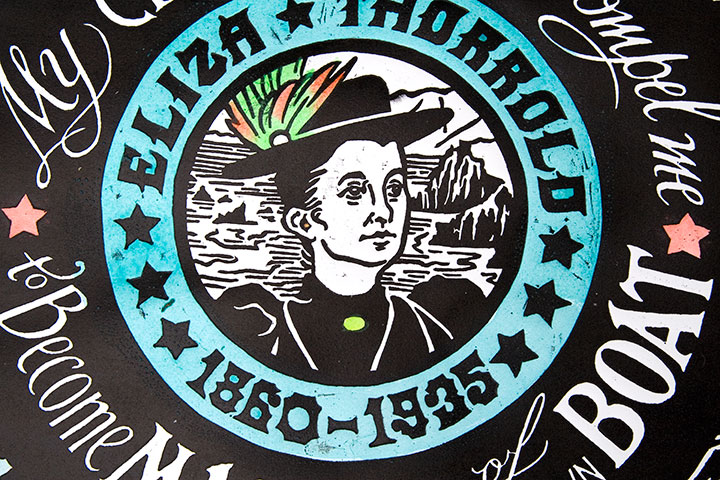
September 22nd, 2011
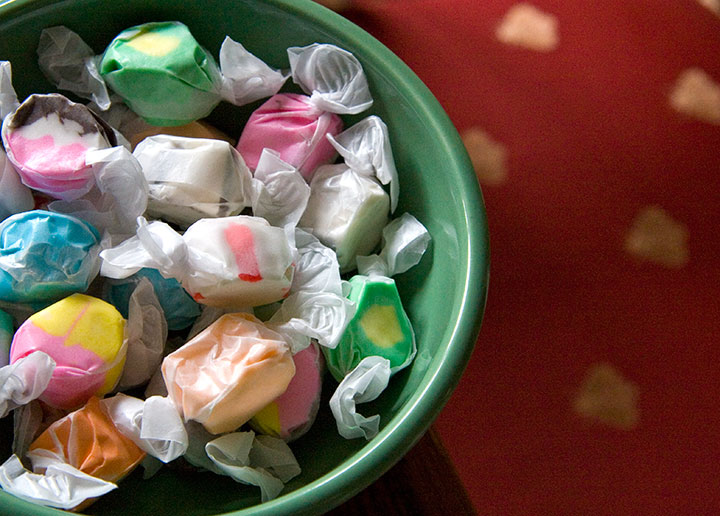
Splurging on a giant bag of salt water taffy is probably a weird way to research a new project, but I swear it’s relevant.
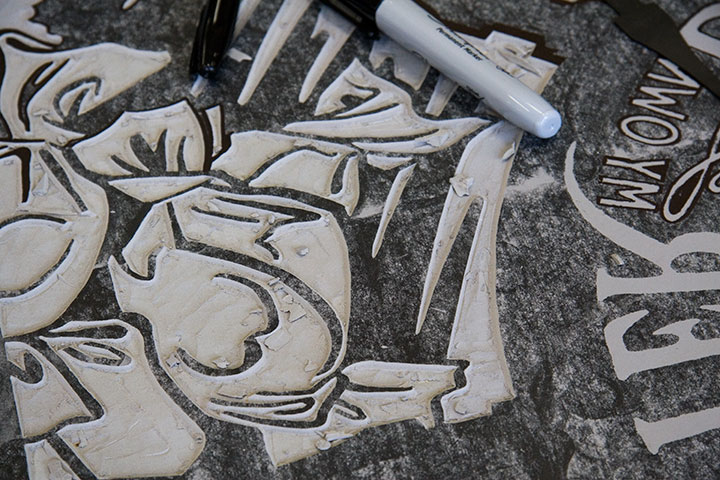
That’s right—Jessica and I are carving again. We’ve been invited by the good folks at the San Francisco Center for the Book (big shout-out to the amazing Rocket!) to be among the featured artist at their eighth-annual Roadworks festival this weekend! Needless to say, we’re super excited.
So if you’re in the Bay Area, swing on by the Potrero and check it out—it promises to be a real hootenanny. The party will be taking up a whole block, chock full of artist vendors, food carts, letterpress demos, and, of course, steamroller printing! And since these guys are rumored to be the original, no-kidding inventors of steamroller printing, they’ll show you how it’s done, for real. Here’s the scoop:
Roadworks 2011
Saturday, September 24
12 to 5 pm, Free!
Hosted by the San Francisco Center for the Book
Rhode Island Street, between 16th and 17th Streets
San Francisco, CA
As a bonus, stick around afterward for a gallery reception for the steamroller prints at 6 pm. There’ll be drinks, music, and a whole lot of loopy artists covered in ink.
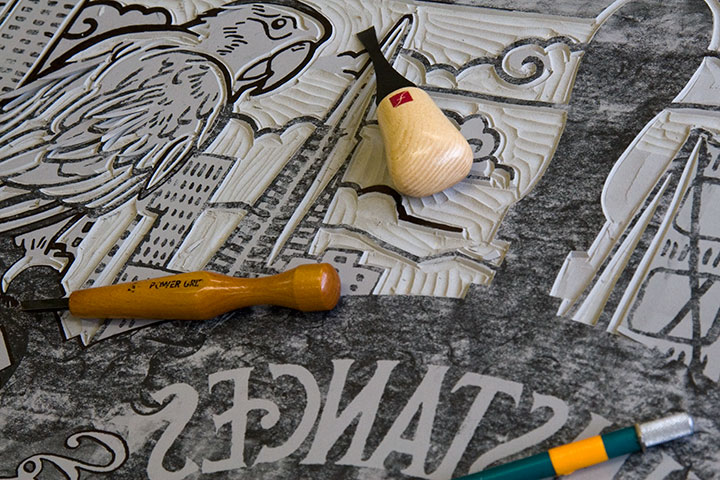
We’ve designed a brand-new, San Francisco-themed, honorary Dead Feminist for the occasion. I won’t reveal who she is until we get back, but here’s a hint: she knew her way around a fo’c’sle and a taffy pull equally well.
And of course, in honor of our muse, we’ll be sharing that salt water taffy at our table. It’s the good stuff, we promise. (Well, we had to sample it, didn’t we?)
See you in San Francisco!
June 19th, 2011
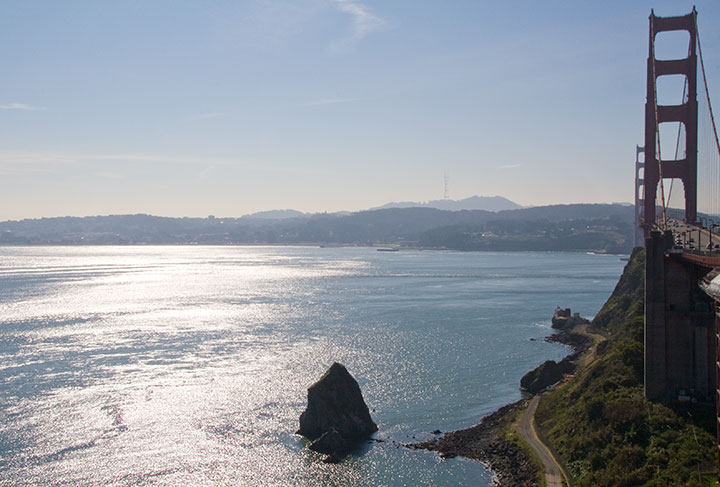
Even though my trip south originally brought me across the Bay, it seemed like San Francisco was the logical starting point for my long trek home along the coast.
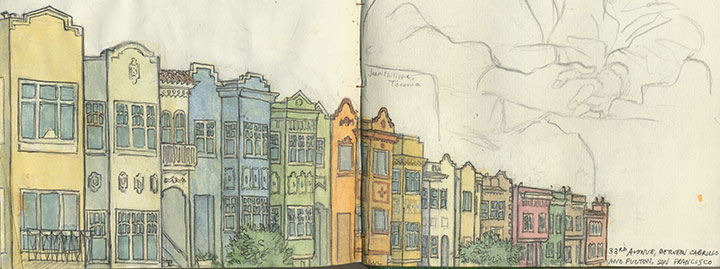
So after a quick sketch (while humming that Journey song that popped into my head for the umpteenth time), I crossed the bridge and headed north.
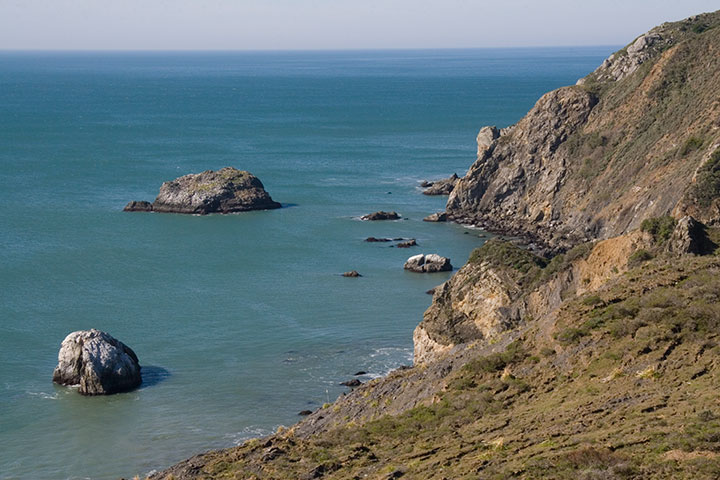
It wasn’t long before I’d left civilization almost completely behind. My chosen route was the (in)famous Highway One, which winds a precarious path along the shore, with breathtaking views and treacherous challenges at every hairpin turn. In other words, it was perfect in nearly every way. Despite the environmental guilt of it all, I confess that I love driving—and hugging the curves of 300 miles of switchbacks in a stick-shift Subaru? Pure, unadulterated bliss. And while I missed the company of the Tailor, or any of my other traditional travel buddies, it was nice to be able to stop and take a picture every thirty seconds, without the risk of annoying anyone!
I knew that by traveling the Coast Highway on a weekday in February, I’d have the place pretty much to myself. But I was completely unprepared for the solitude that awaited me at my first stop along the way: Point Reyes National Seashore.
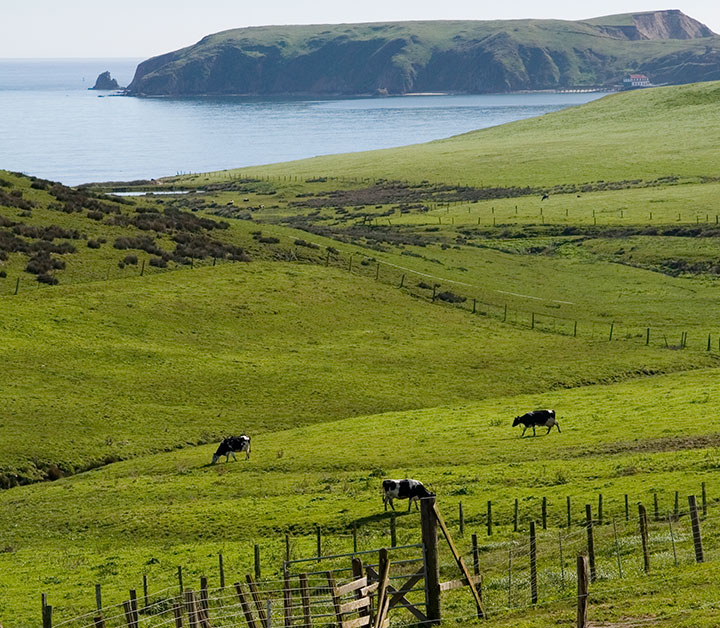
Point Reyes is a long, jagged cape with an equally long history. Sir Francis Drake reportedly landed there in 1579, and people have inhabited it, farmed it, settled it, and even wrecked their ships upon it for many, many generations. Since the 1850s much of the land has been parceled out into dairy farms, which are still in operation today, thanks to the protection of the National Park Service.
What first struck me about the place is the near total absence of trees. The place reminded me more of the Scottish highlands than anything I’d seen in California—and in fact, one of the few small towns located on the peninsula is called Inverness.
And I’m sure that at the height of summer, the place is crawling with tourists—but that day I was completely alone. For miles and miles and miles, it was just me and the cows.
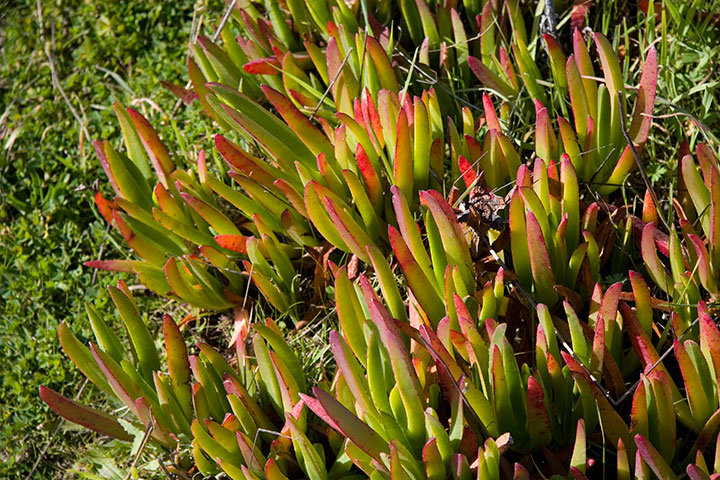
I hadn’t intended to travel the whole length of the cape; I wasn’t on a fixed timetable or anything, but by that point it was already late morning. But I saw a sign indicating a lighthouse ahead, so I kept going. There was no mile count on the sign, and I didn’t bother to fish out the map. It couldn’t be far, right? Well, the road wound on and on and on, with no sign of a lighthouse, and no indication of where this would end. But then, a full twenty miles on, the track came to an abrupt end. I got out of the car, faced back north, and nearly had to pick my jaw up off the ground.

The lighthouse was just a short hike from there:
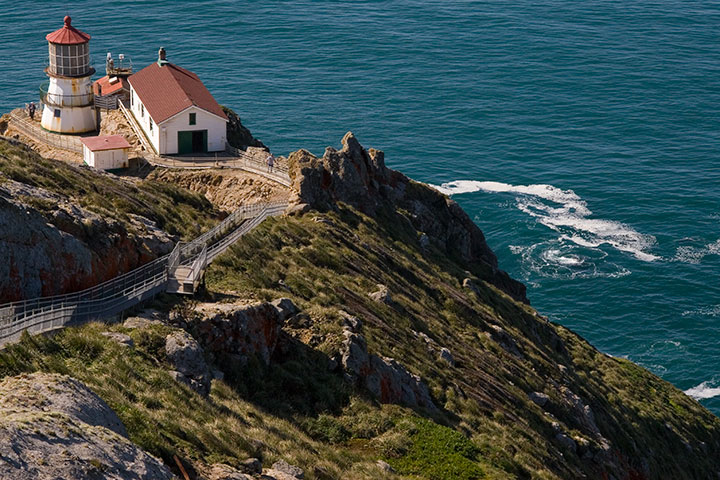
I could see why people were forever dashing their boats upon the rocks.
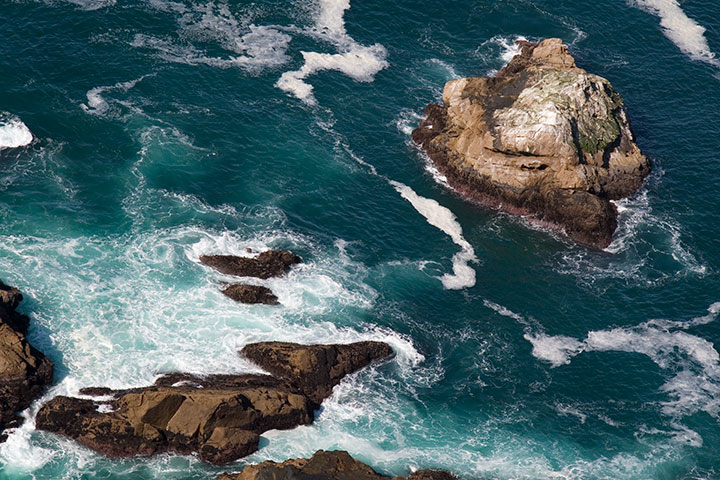
And that wasn’t the only thing I could see. I was staring into the bright teal surf when something surfaced and caught my eye:
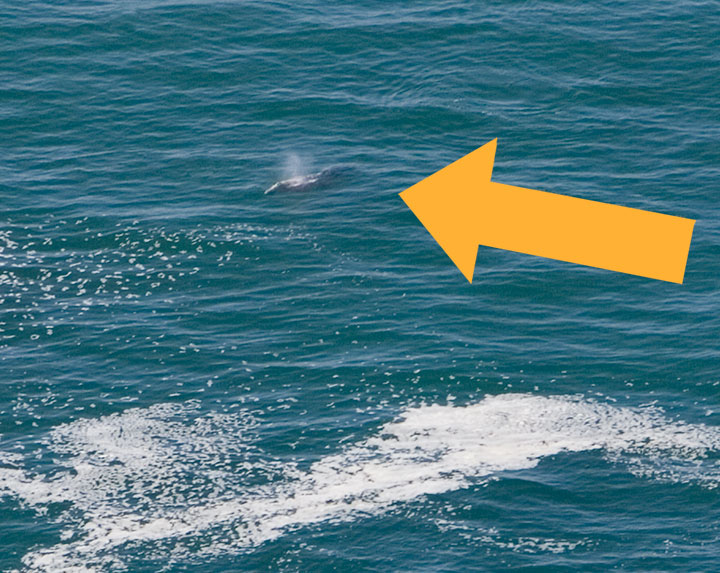
A gray whale! It’s funny—I’ve lived on one coast or another for over eleven years of my life, and I’d never seen a whale in person before. If that wasn’t worth the forty-mile detour, I don’t know what is.
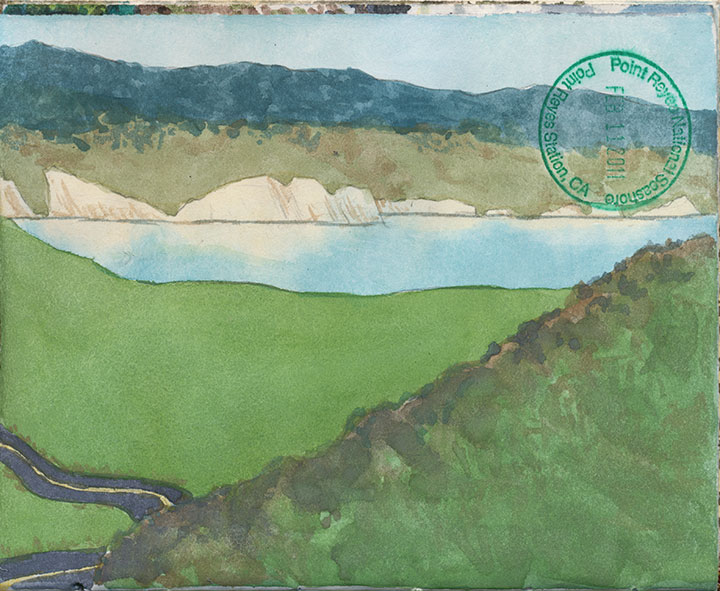
After the whale-watching and a 2-minute watercolor, I made the long trek back to the highway.
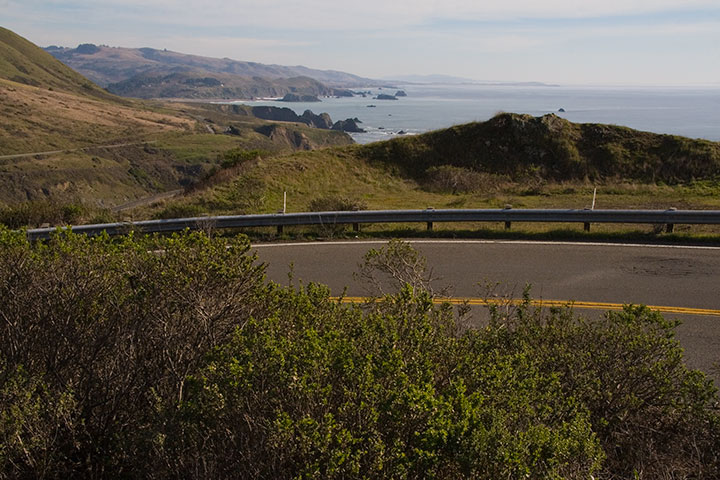
The remaining stretch of Highway One was almost equally deserted. It made the miles melt away quickly, and gave me the feeling that I had the whole Pacific to myself.
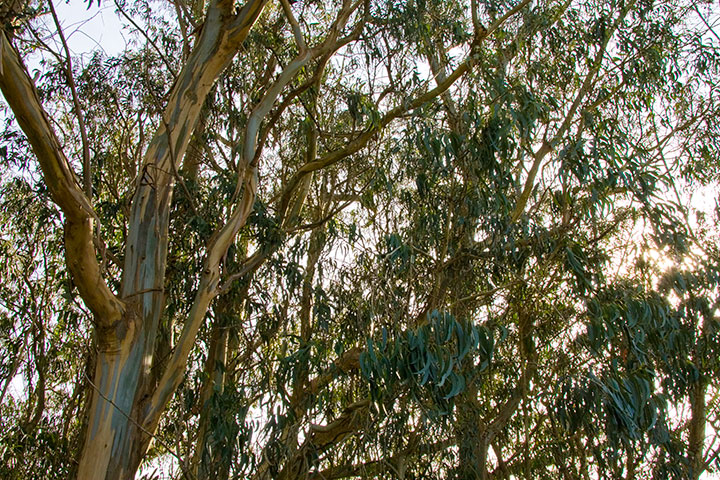
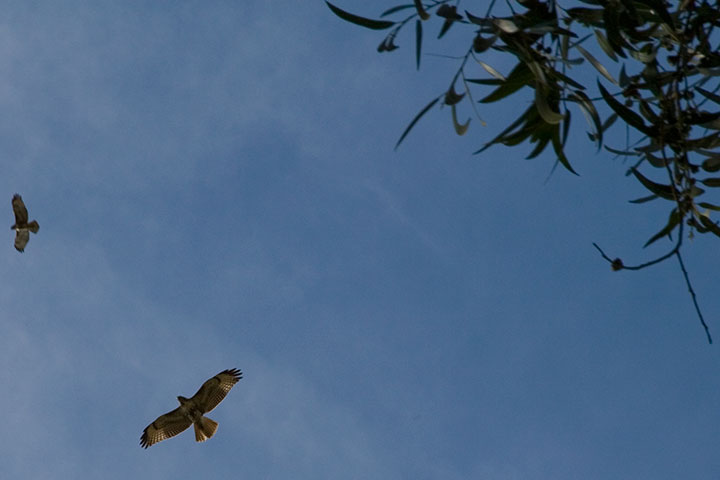
Before long, the rolling hills and eucalyptus trees tapered off,
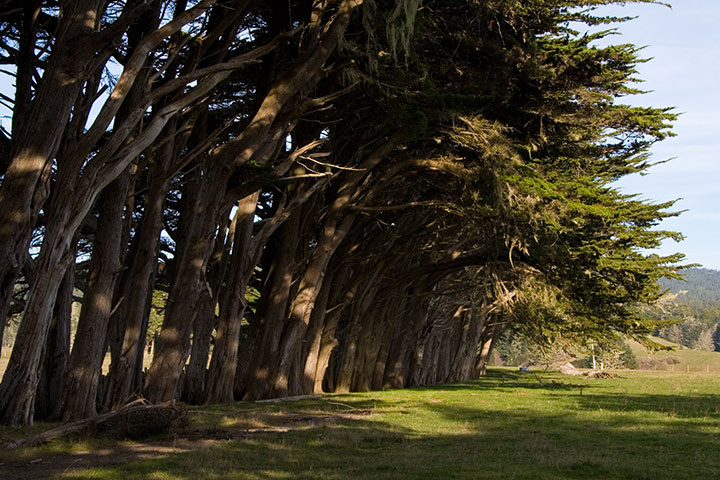
and the landscape gave way to cypress stands and evergreen forests.
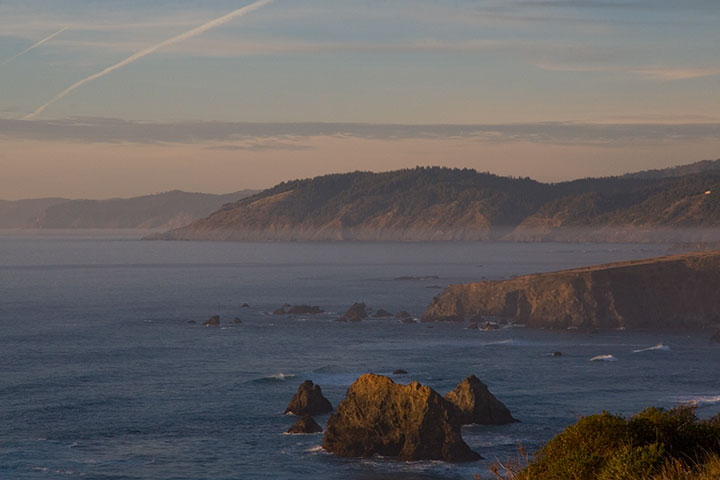
The road ended just as the day did. As the sun went down the path turned eastward, away from the shore, and plunged into the thick darkness of coastal forest. By the time I pulled into a hotel for the night, it was pitch black, and Highway One had been replaced by the other Pacific Highway: US 101. I was in completely unfamiliar territory, and would be until I came all the way north to Astoria several days later, but despite the darkness and lack of bearings, I knew what lay ahead. And I was almost too excited to sleep, because I knew that in the morning, the sun would reveal exactly where I was: in the heart of redwood country.
February 17th, 2011
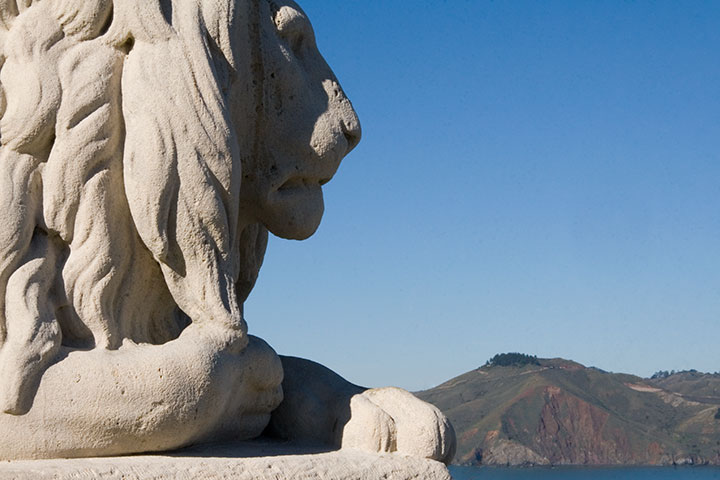
After thirteen days and 2,382 miles on the road, I’m finally home in the real world again. And that’s exactly how it feels—like I’ve been in a land of make-believe for the past two weeks. A place of impossible landscapes and endless shorelines and absolutely no connection to things like phones and computers and deadlines and to-do lists.
Now that I’ve washed back ashore, however, there are photos to edit and sketches to scan before I can tell you about it. In the meantime, Jessica and I have a schedule to keep: as advertised, our next Dead Feminist broadside is back from Codex and ready to share. Look for it here and in the shop tomorrow.
See you then!

![Chandler O'Leary [logo]](https://chandleroleary.com/wp-content/themes/chandleroleary/images/logo.png)






























































